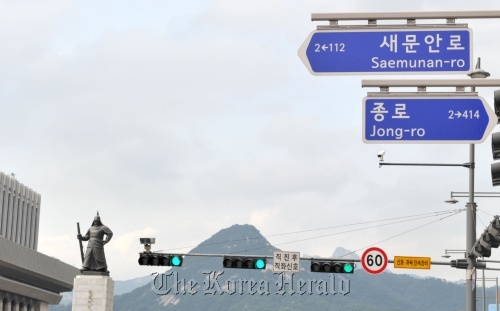After decades of confusion, Korea has ditched its traditional address system and adopted one based on named streets and consecutively-numbered buildings.
But many residents are less than happy, saying a cultural legacy has been abandoned in the name of logic.
From July 29 all the country’s 5.68 million houses, apartments and other buildings were given new legal addresses ― meaning they replace old addresses in official documents such as IDs, property registration forms and contracts.
Traditional addresses, in use since 1910, identify specific land lots. The address of a typical Seoul house is: Seoul City, a gu (ward), a dong (neighborhood), and the number of the lot on which it stands.
In many cases the lot number was assigned in the order in which buildings were erected, not in street order.
The system ― adopted during the Japanese colonial occupation ― has proved a boon to makers of satellite navigation systems but mystifying for many others. Invitations to social or business events routinely include a map.
The government says the change is intended to eliminate confusion and move to a new system “used in developed countries that fits international standards.”
Removing one legacy of Japan’s harsh rule is another reason for the switchover, on which authorities have been working since 1996. Since then they have given numbers or new names to 158,000 streets and roads nationwide.
But many residents are less than happy, saying a cultural legacy has been abandoned in the name of logic.
From July 29 all the country’s 5.68 million houses, apartments and other buildings were given new legal addresses ― meaning they replace old addresses in official documents such as IDs, property registration forms and contracts.
Traditional addresses, in use since 1910, identify specific land lots. The address of a typical Seoul house is: Seoul City, a gu (ward), a dong (neighborhood), and the number of the lot on which it stands.
In many cases the lot number was assigned in the order in which buildings were erected, not in street order.
The system ― adopted during the Japanese colonial occupation ― has proved a boon to makers of satellite navigation systems but mystifying for many others. Invitations to social or business events routinely include a map.
The government says the change is intended to eliminate confusion and move to a new system “used in developed countries that fits international standards.”
Removing one legacy of Japan’s harsh rule is another reason for the switchover, on which authorities have been working since 1996. Since then they have given numbers or new names to 158,000 streets and roads nationwide.

The new addresses will be used together with the old ones for the next two years. But starting in 2014, the new ones will be dominant, according to the Ministry of Public Administration and Security.
Critics say the new system will phase out some 36,000 traditional names of ri (villages) and 3,400 names of dong (neighborhoods) as new addresses pinpoint buildings through a numbered street system.
“Traditional addresses are not mere names and numbers. They have their own story to tell and unique history,” Jung Woo-sik, president of the Korea Young Buddhists Association, told AFP.
Jung said his association and other activists will consider a legal petition to stop the use of the new address system, under which he said at least 200 geographical names linked to Buddhism will disappear.
For example, the name of an old neighborhood ― Mia-dong in northern Seoul ― won’t appear in future. Mia-dong was derived from Mia-ri, where an old Buddhist temple named Mia stood.
Mia-dong also has historic resonance. South Korean civilians arrested by North Korean troops during the 1950-53 war were forcibly taken across the border over Mia-ri hill ― an incident which inspired a famous song.
Hwang Pyung-woo, director of the Korea Cultural Heritage Policy Research Institute, said greater convenience in finding addresses was a main reason for the new system.
But critics say this advantage has lost its justification since the widespread introduction of cellphones with navigation apps.
Jeongman, a spokesman for the country’s largest Buddhist group the Jogye Order, said names of village areas keep the nation’s history and tradition alive.
“These are priceless assets we have to hand down to the next generation,” the monk told journalists.
There are also more mundane considerations. Homeowners in pricey areas such as Banpo-dong think property prices may be affected when the name disappears from addresses.
And delivery firms are resisting the switchover.
“I tried to order Chinese food with my new address just out of curiosity, but I couldn’t,” a 29-year-old company worker surnamed Lee told Korea Joongang Daily.
“The restaurant said I’d only get my food when I gave my old address because the restaurant doesn’t understand the new system.”
(AFP)








![[Kim Seong-kon] Democracy and the future of South Korea](http://res.heraldm.com/phpwas/restmb_idxmake.php?idx=644&simg=/content/image/2024/04/16/20240416050802_0.jpg&u=)







![[KH Explains] Hyundai's full hybrid edge to pay off amid slow transition to pure EVs](http://res.heraldm.com/phpwas/restmb_idxmake.php?idx=652&simg=/content/image/2024/04/18/20240418050645_0.jpg&u=20240418181020)

![[Today’s K-pop] Zico drops snippet of collaboration with Jennie](http://res.heraldm.com/phpwas/restmb_idxmake.php?idx=642&simg=/content/image/2024/04/18/20240418050702_0.jpg&u=)